How Tech Advancements Translate to the Classroom
While the year 2020 has left many teachers’ and students' lives upended, a faction of them were ready and prepared to pivot to a remote world.
For the past decade, many career and technical education teachers who teach CTE classes have recognized and embraced the advancement in tech and how that influences the world of work. In fact, since the 1970s, and even more quickly since the first 'computer in a pocket' came into our lives, new technology adoption has increased exponentially. For data junkies like me, there are some great visuals showing the rapid pace of change, often referred to as Moore’s Law here.
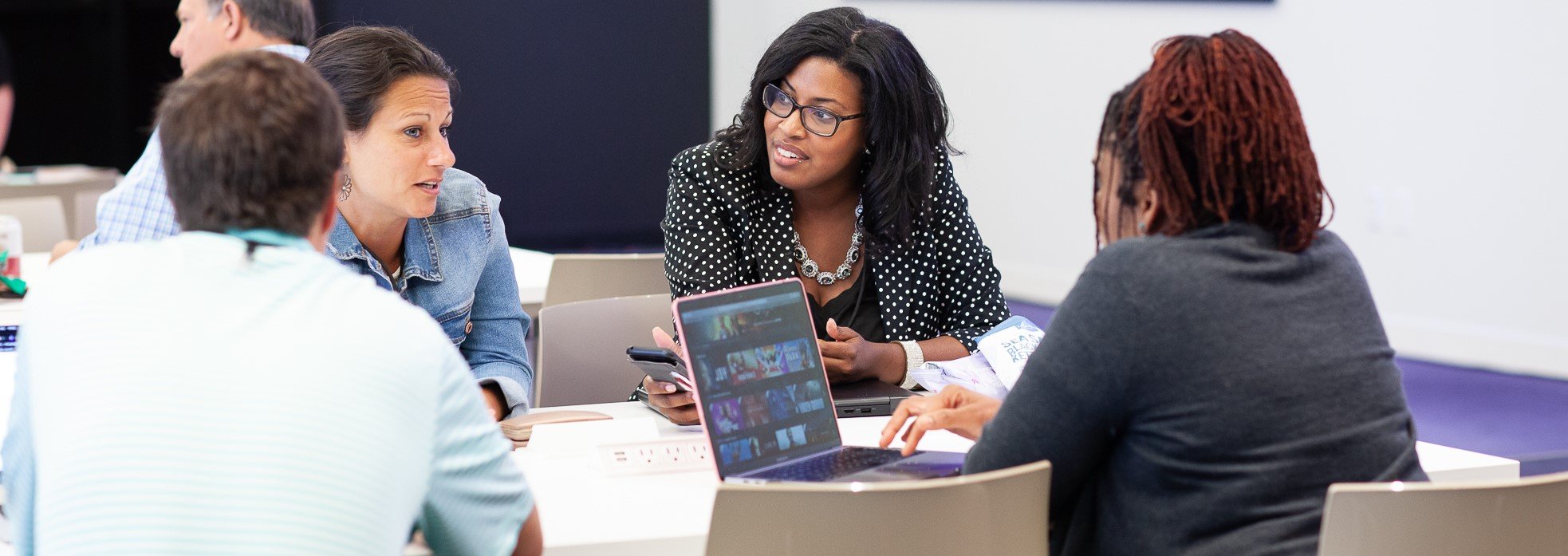
The power and excitement of these advancements can be a challenge to harness in a school setting. As educators know, schools and districts are beholden to due diligence that can be anything but rapid. To make things more complicated, many schools and districts are bogged down by bureaucratic hurdles that make it harder for teachers to iterate and teach new content in a timely manner. Course syllabi must be approved, new courses can take years to launch, and teachers are faced with teaching outdated content. And, this year has brought unique challenges around remote teaching — educators are exhausted by requirements and pivots.
So, how is it possible to provide students purposeful learning to support career readiness when 'in demand' skills are rapidly changing, and when there are more tasks to do than there are hours in the day?
How Teachers Can Keep Pace to Benefit Students
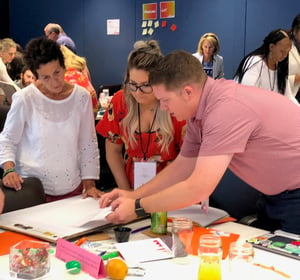 Even though it’s hard for educators to feel confident and competent enough to lead young people through content that is new to them, there are many who have learned to thrive in this state of ambiguity. These are educators who have accepted that the only constant is change, and that the most important skills are knowing how to learn and adapt to change.
Even though it’s hard for educators to feel confident and competent enough to lead young people through content that is new to them, there are many who have learned to thrive in this state of ambiguity. These are educators who have accepted that the only constant is change, and that the most important skills are knowing how to learn and adapt to change.
Author and educator, George Couros, was our esteemed keynote at the 2020 Uncharted Learning National Summit. For the past five years, he’s been inspiring me to improve as an educator and leader of educators. When I first learned of the eight characteristics of the Innovator’s Mindset, I saw it as an approach to guide educators to nimbly change their practices so that students benefit. George encourages teachers to become “Master Learners” who are proficient at learning for their students and who are “comfortable with the fact that they [we] don’t know everything.”
A Shift for Teachers
Similarly, at Uncharted Learning, we support member teachers to evolve into the role of “expert learners” who embrace the opportunity to model flexibility and learning for their students. Our entrepreneurship-based training programs throw educators into the deep end of learning — quickly engaging them in instructional strategies and content to lead learners.
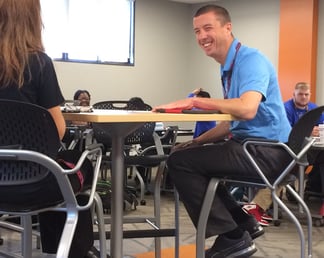 My favorite Uncharted Learning norm “expose your ignorance”, represents a shift in thinking for some teachers, especially those who are passionate or skilled in a content area. "It’s hard to tell students that you do not know something, but it is incredibly powerful for them to see." Mr. Couros says.
My favorite Uncharted Learning norm “expose your ignorance”, represents a shift in thinking for some teachers, especially those who are passionate or skilled in a content area. "It’s hard to tell students that you do not know something, but it is incredibly powerful for them to see." Mr. Couros says.
Educators preparing to teach Uncharted Learning curriculum or who are teaching CTE classes take part in comprehensive professional development. All our training is based on entrepreneur skill building and is anchored by evergreen curricula, updated each year with the support of industry professionals. This allows teachers to focus on the students and instruction, as the content is fresh and aligned with current industry practices and needs. These educators become empowered to implement a new curriculum without the requirement that they know everything.
“Teaching entrepreneurship forces me to always be on my game and model the same passion, dedication, and willingness to fail that I expect of my students.”
~ Kurt Wismer, Horace Mann High School, Uncharted Learning educator
Breathe Relevancy into the Student Experience
Not all schools choose to dedicate an entire class to an innovative field like entrepreneurship or app development. Instead they may seek effective professional development for teachers to impact students within existing curriculum. In this new workshop series, teachers of any discipline can expand knowledge of entrepreneur tools and methods to enhance any course.
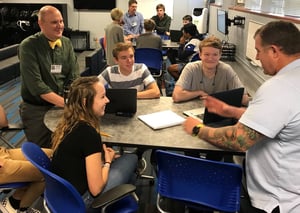 Many school leaders encourage educators to allow students to learn by doing. As George says in his new book (Innovate Inside the Box), “The best way to develop the leaders of ‘tomorrow’ is to give our students opportunities to lead today.” So, many school leaders expose their faculty to resources like the Stanford d.school bootleg, videos from the Teaching Channel, articles on edutopia, newsletters and podcasts from Edsurge, and CS For All to provide them with instructional strategies and lesson ideas that breathe relevancy into the student experience.
Many school leaders encourage educators to allow students to learn by doing. As George says in his new book (Innovate Inside the Box), “The best way to develop the leaders of ‘tomorrow’ is to give our students opportunities to lead today.” So, many school leaders expose their faculty to resources like the Stanford d.school bootleg, videos from the Teaching Channel, articles on edutopia, newsletters and podcasts from Edsurge, and CS For All to provide them with instructional strategies and lesson ideas that breathe relevancy into the student experience.
A Challenge:
How to Expose Students to Relevant, Current Content (While Minimizing Teacher Burnout)
1. Get Together
Kick off your journey with a department-level brainstorm (in person or remotely) to determine the strengths and challenges of your current approach. Get all of your CTE teachers together in one (Zoom) room and ask — 'How are we keeping pace with industry for our students?' When done correctly, brainstorming can actually re-energize you because it gives you time to think.
2. Identify one or two solutions
After you have outlined your current landscape, see what solution rises to the top — they best choice for you and your students. Personally, you may realize an area for development and may be motivated to take a class, or attend a workshop.
3. Set a small goal
After you have defined your strengths and challenges, set a small goal and be prepared to iterate. As teachers, sometimes we can get caught up in the details of planning.
4. Be agile and don’t spend forever planning.
Don't overdo it...What goal can you set for the next unit or month?
5. Seek accountability
Make your goal public or find a professional community to guide and encourage you to finish what you set out to accomplish.
Community and Growth
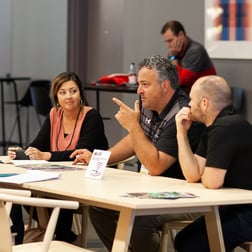 From Innovate Inside the Box, George Couros states, “sharing, hearing, and acting upon the voices of others is essential to progress.” When a teacher is networked with others, they are more likely to innovate and succeed. In order to support their students to understand the value of networking and connecting with professionals, teachers must also practice it themselves. Ultimately, it’s much easier to change, grow, and improve when you know you are not alone.
From Innovate Inside the Box, George Couros states, “sharing, hearing, and acting upon the voices of others is essential to progress.” When a teacher is networked with others, they are more likely to innovate and succeed. In order to support their students to understand the value of networking and connecting with professionals, teachers must also practice it themselves. Ultimately, it’s much easier to change, grow, and improve when you know you are not alone.
Personally, I believe deeply in the power of a community of educators, and encourage all educators to 'expose your ignorance' among your colleagues in the spirit of growth and student success.
Interested in a Workshop to develop learn entrepreneurship skills and industry-driven practices to infuse your class(es) with relevancy? Check out our new workshop: Entrepreneurship Across the Curriculum.

